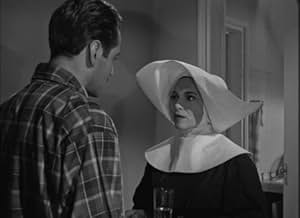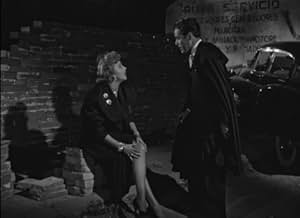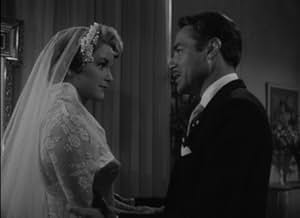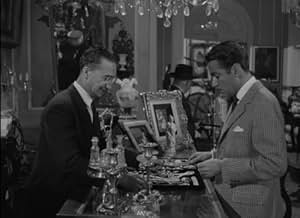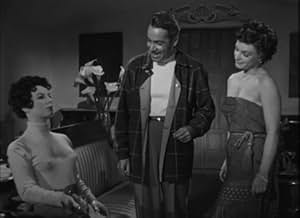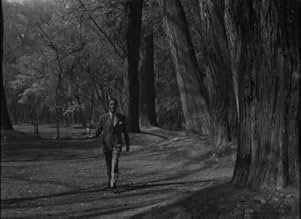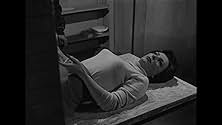CALIFICACIÓN DE IMDb
7.6/10
6.2 k
TU CALIFICACIÓN
El viaje delirante de un hombre con un desorden mental, obsesionado en hacer el crimen perfecto.El viaje delirante de un hombre con un desorden mental, obsesionado en hacer el crimen perfecto.El viaje delirante de un hombre con un desorden mental, obsesionado en hacer el crimen perfecto.
- Dirección
- Guionistas
- Elenco
- Premios
- 1 premio ganado y 8 nominaciones en total
Ariadne Welter
- Carlota Cervantes
- (as Ariadna Welter)
José María Linares-Rivas
- Willy Corduran
- (as J.M. Linares Rivas)
Enrique Díaz Indiano
- Señor de la Cruz
- (as Enrique Indiano)
Carlos Martínez Baena
- Padre Alonso
- (as Carlos M. Baena)
Armando Acosta
- Hombre casa juegos
- (sin créditos)
Eduardo Alcaraz
- Gordo Azuara
- (sin créditos)
Janet Alcoriza
- Turista de Oklahoma
- (sin créditos)
- Dirección
- Guionistas
- Todo el elenco y el equipo
- Producción, taquilla y más en IMDbPro
Opiniones destacadas
Again, Bunuel explores the disturbing mentality of a member of the privileged class. The premise is very amusing: a would-be serial killer whose attempts are constantly thwarted by circumstance. The film has some wonderful touches like the demented music box theme, the fantasies when Archie gets in one of his murderous moods, and again a focus on the lower half of the female form. Ernesto Alonso and the entire cast are terrific. However, the film does have a certain sluggishness to it, and the first two acts in particular seem to contain a lot of superfluous material that doesn't add much to the whole. I also feel the ending could use more of a cynical bite to it. Still, it's better than a lot of his 50's work, if not quite as remarkable as EL or LOS OLVIDADOS.
Criminal Life of Archibaldo de la Cruz, The (1955)
** 1/2 (out of 4)
Luis Bunuel film that sounds more interesting than it turns out to be. As a young child, Archibaldo is told of a magical magic box that when turned on will kill. As an adult, Archibaldo comes across this box again and this times plans to use it to help him become a serial killer. There's a lot of black humor scattered throughout the film but very little of it made me laugh. The opening segments bashing the rich were funny but the film slowly falls apart in the middle and never regains any speed. The story is a very good one but the director does very little with it, which is a shame because this should have been a whole lot better.
** 1/2 (out of 4)
Luis Bunuel film that sounds more interesting than it turns out to be. As a young child, Archibaldo is told of a magical magic box that when turned on will kill. As an adult, Archibaldo comes across this box again and this times plans to use it to help him become a serial killer. There's a lot of black humor scattered throughout the film but very little of it made me laugh. The opening segments bashing the rich were funny but the film slowly falls apart in the middle and never regains any speed. The story is a very good one but the director does very little with it, which is a shame because this should have been a whole lot better.
In the 50's, in Mexico, Archibaldo de la Cruz (Ernesto Alonso) comes to a judge to confess crimes of his own. He tells his life since he was a spoiled boy, in the days of the Mexican revolution, when he won a music box from his mother and developed a bizarre desire of killing women, becoming a serial killer. In the end, this movie is a psychological dark comedy of the Mexican phase of Buñuel. I have just had the chance to see this film on DVD, recently released by the best Brazilian distributor (Versátil), and I found it another excellent work of Buñuel, one of my favorite directors ever. The story is very ironic and unpredictable, and I totally disagree with the User Comments `Minor Buñuel' indicated for this film. My vote is nine.
Title (Brazil): `Ensaio de um Crime' (`Rehearsal for a Crime')
Title (Brazil): `Ensaio de um Crime' (`Rehearsal for a Crime')
Following your advice, I recently `relented' to buying from Alapage the two Luis Bunuel Double-Feature discs released in France by Film Sans Frontieres. After watching them in their entirety, I cannot believe that I, who consider Bunuel my all-time favorite director and one of the true masters of the medium, have waited this long to acquire these DVDs. Actually while Alapage listed these DVDs at EUR25.73 on their site, they only cost me EUR21.51 each (excluding EUR12 shipping charges). So, if there is still anybody who has not purchased them yet, now may be the time to do so!
Since I had never watched EL (1952) before, it was the first one to go through my DVD player. It was a chilling parable of an insanely jealous middle-aged man played with acute intensity by Arturo De Cordova. It afforded Bunuel ample opportunity to make practical use of overt Freudian symbolism without lending the film a heavy-handed air of pretentiousness. While there are some critics who consider it as merely `an engaging, minor work', I regard it as being among Bunuel's finest; arguably, with this film, Bunuel reached the culmination of his work in Mexico, but it also looks forward to similar sequences and themes he would tackle later on in his career, especially TRISTANA (1970) and, his last film, THAT OBSCURE OBJECT OF DESIRE (1977).
EL was beautifully abetted by another of his low-budget Mexican films, the great black comedy THE CRIMINAL LIFE OF ARCHIBALDO DE LA CRUZ (1955). Again, critical reception was a bit muted in some circles, dismissing it as `just a throwaway oddity' typical of Bunuel's films of the period. However, it is much more than that: it is certainly very funny if you can accept its macabre sense of humor. It allowed Bunuel to create some of the most memorable images in all of his films, especially the celebrated dummy incineration scene, which could have been "inspired" by a similar scene in Michael Curtiz's marvelous MYSTERY OF THE WAX MUSEUM (1933) which Bunuel must have seen while working at Warner Bros. in the Thirties. A similar instance of this eclectic approach on Bunuel's part can be found in the "walking hand" sequence in his THE EXTERMINATING ANGEL (1962) - one of my favorite Bunuels - which harks back to an identical premise in Robert Florey's THE BEAST WITH FIVE FINGERS (1946), another Warner Bros. horror melodrama. For me, one of the enduring assets of THE CRIMINAL LIFE OF ARCHIBALDO DE LA CRUZ is the charm and great beauty that was Miroslava Stern (who played the part of Lavinia and was the model for the ill-fated dummy). Tragically, she would take her own life a mere two weeks after the film's release with her body, ironically enough, ending up cremated!
Both the print utilized and the transfer for both films were adequate enough, and perfectly acceptable under the circumstances. However, EL's overall visual and aural qualities where distinctly superior to those of ARCHIBALDO which suffered from excessive specks and slight audio dropouts at times, but were never so alarming as to dispel from one's viewing pleasure of the film.
Since I had never watched EL (1952) before, it was the first one to go through my DVD player. It was a chilling parable of an insanely jealous middle-aged man played with acute intensity by Arturo De Cordova. It afforded Bunuel ample opportunity to make practical use of overt Freudian symbolism without lending the film a heavy-handed air of pretentiousness. While there are some critics who consider it as merely `an engaging, minor work', I regard it as being among Bunuel's finest; arguably, with this film, Bunuel reached the culmination of his work in Mexico, but it also looks forward to similar sequences and themes he would tackle later on in his career, especially TRISTANA (1970) and, his last film, THAT OBSCURE OBJECT OF DESIRE (1977).
EL was beautifully abetted by another of his low-budget Mexican films, the great black comedy THE CRIMINAL LIFE OF ARCHIBALDO DE LA CRUZ (1955). Again, critical reception was a bit muted in some circles, dismissing it as `just a throwaway oddity' typical of Bunuel's films of the period. However, it is much more than that: it is certainly very funny if you can accept its macabre sense of humor. It allowed Bunuel to create some of the most memorable images in all of his films, especially the celebrated dummy incineration scene, which could have been "inspired" by a similar scene in Michael Curtiz's marvelous MYSTERY OF THE WAX MUSEUM (1933) which Bunuel must have seen while working at Warner Bros. in the Thirties. A similar instance of this eclectic approach on Bunuel's part can be found in the "walking hand" sequence in his THE EXTERMINATING ANGEL (1962) - one of my favorite Bunuels - which harks back to an identical premise in Robert Florey's THE BEAST WITH FIVE FINGERS (1946), another Warner Bros. horror melodrama. For me, one of the enduring assets of THE CRIMINAL LIFE OF ARCHIBALDO DE LA CRUZ is the charm and great beauty that was Miroslava Stern (who played the part of Lavinia and was the model for the ill-fated dummy). Tragically, she would take her own life a mere two weeks after the film's release with her body, ironically enough, ending up cremated!
Both the print utilized and the transfer for both films were adequate enough, and perfectly acceptable under the circumstances. However, EL's overall visual and aural qualities where distinctly superior to those of ARCHIBALDO which suffered from excessive specks and slight audio dropouts at times, but were never so alarming as to dispel from one's viewing pleasure of the film.
The delirious journey of a mental disordered man (Archibaldo de la Cruz) , who is obsessed in making the perfect crime. As boy, Archibaldo witnesses his governess' death and is fascinated by what he feels . As a man he's obsessed with murder and dying . Undoubtedly, death encircles the always obsessed Archibaldo, and the targets are ordinarily unfortunate women (Miroslava who subsequenly committed suicide , Rita Macedo, Ariadna Welter).
A bitter and attractive diatribe about a boy who seeing the death of his governess has a lasting effect on his adult life , as he grows up to be a demented cretin -well played by Ernesto Alonso- whose failure with women leads him to conspire to kill every one he meets , a task at which he also fails . Buñuel marshals all of his characteristic amoral wit in this story of a would-be murderer at every turn in his efforts to get his kicks from a unsuccessful sex murder . This is an enjoyable but minor psychological drama from Buñuel in Spanish with English subtitles , dealing with a strange and powerful obsession stemming from a pampered childhood . As usual, the Spaniard master schews the visual fussiness of style , opting for the straightforward camera set-up at all times. The use of props like the toy music box from his infancy which triggers off Archibaldo's lust and the wax dummy burned one of his attempts is thwarted , is all the more hilarious and surprising as a result .
This agreeable motion picture was produced in short budget by Roberto Figueroa and Alfonso Patiño Gómez ; being compellingly directed by Luis Buñuel who was voted the 14th Greatest Director of all time . This Buñuel's peculiar film belongs to his Mexican period ; in fact , it's plenty of known Mexican actors . Born in Calanda , Aragon (1900) , Buñuel then moved to Madrid to study at the university there, where his close friends included Salvador Dalí and Federico García Lorca . After moving to Paris , at the beginning Buñuel did a variety of film-related odd jobs , including working as an assistant to director Jean Epstein . With financial help from his mother and creative assistance of the surrealist Dalí, he made his first film , a 17-minute short titled "Un Chien Andalou" (1929), and immediately catapulted himself into film history thanks to its disturbing images and abstract plot . The following year , sponsored by wealthy art patrons, he made his first picture , the scabrous witty and violent "Age of Gold" (1930), which mercilessly attacked the church and the middle classes, themes that would preoccupy Buñuel for the rest of his career . That career, though, seemed almost over by the mid-1930s, as he found work increasingly hard to come by and in the pre-Spanish Civil War , he made the documentary ¨Las Hurdes¨(1933) , the Luis emigrated to the US where he worked for the Museum of Modern Art and as a film dubber for Warner Bros . He subsequently started his Mexican period and he teamed up with producer Óscar Dancigers and after a couple of unmemorable efforts shot back to international attention with the lacerating study of Mexican street urchins in ¨Los Olvidados¨ (1950), winning him the Best Director award at the Cannes Film Festival. But despite this new-found acclaim, Buñuel spent much of the next decade working on a variety of ultra-low-budget films, few of which made much impact outside Spanish-speaking countries , though many of them are well worth seeking out . As he went on filming "The Great Madcap" , ¨The brute¨, "Wuthering Heights", ¨El¨ , "The Criminal Life of Archibaldo De la Cruz" , ¨Robinson Crusoe¨ , ¨Death in the garden¨ and many others . Rating "Criminal life of Archibaldo de la Cruz" : 6.5/10 , decent movie , but much too talky , it sounds far more interesting than it plays.
A bitter and attractive diatribe about a boy who seeing the death of his governess has a lasting effect on his adult life , as he grows up to be a demented cretin -well played by Ernesto Alonso- whose failure with women leads him to conspire to kill every one he meets , a task at which he also fails . Buñuel marshals all of his characteristic amoral wit in this story of a would-be murderer at every turn in his efforts to get his kicks from a unsuccessful sex murder . This is an enjoyable but minor psychological drama from Buñuel in Spanish with English subtitles , dealing with a strange and powerful obsession stemming from a pampered childhood . As usual, the Spaniard master schews the visual fussiness of style , opting for the straightforward camera set-up at all times. The use of props like the toy music box from his infancy which triggers off Archibaldo's lust and the wax dummy burned one of his attempts is thwarted , is all the more hilarious and surprising as a result .
This agreeable motion picture was produced in short budget by Roberto Figueroa and Alfonso Patiño Gómez ; being compellingly directed by Luis Buñuel who was voted the 14th Greatest Director of all time . This Buñuel's peculiar film belongs to his Mexican period ; in fact , it's plenty of known Mexican actors . Born in Calanda , Aragon (1900) , Buñuel then moved to Madrid to study at the university there, where his close friends included Salvador Dalí and Federico García Lorca . After moving to Paris , at the beginning Buñuel did a variety of film-related odd jobs , including working as an assistant to director Jean Epstein . With financial help from his mother and creative assistance of the surrealist Dalí, he made his first film , a 17-minute short titled "Un Chien Andalou" (1929), and immediately catapulted himself into film history thanks to its disturbing images and abstract plot . The following year , sponsored by wealthy art patrons, he made his first picture , the scabrous witty and violent "Age of Gold" (1930), which mercilessly attacked the church and the middle classes, themes that would preoccupy Buñuel for the rest of his career . That career, though, seemed almost over by the mid-1930s, as he found work increasingly hard to come by and in the pre-Spanish Civil War , he made the documentary ¨Las Hurdes¨(1933) , the Luis emigrated to the US where he worked for the Museum of Modern Art and as a film dubber for Warner Bros . He subsequently started his Mexican period and he teamed up with producer Óscar Dancigers and after a couple of unmemorable efforts shot back to international attention with the lacerating study of Mexican street urchins in ¨Los Olvidados¨ (1950), winning him the Best Director award at the Cannes Film Festival. But despite this new-found acclaim, Buñuel spent much of the next decade working on a variety of ultra-low-budget films, few of which made much impact outside Spanish-speaking countries , though many of them are well worth seeking out . As he went on filming "The Great Madcap" , ¨The brute¨, "Wuthering Heights", ¨El¨ , "The Criminal Life of Archibaldo De la Cruz" , ¨Robinson Crusoe¨ , ¨Death in the garden¨ and many others . Rating "Criminal life of Archibaldo de la Cruz" : 6.5/10 , decent movie , but much too talky , it sounds far more interesting than it plays.
¿Sabías que…?
- TriviaThe movie was shot in the middle of a big economic crisis for the Mexican cinema. Production was about to be shut down a few times and the famous scene with the mannequin being cremated was filmed only once because they couldn't afford another mannequin.
- ErroresWhen the nun falls down the empty elevator shaft she screams loudly but the sound is obviously that of a man; in fact, it sounds like a Wilhelm Scream.
- ConexionesFeatured in Miroslava (1993)
Selecciones populares
Inicia sesión para calificar y agrega a la lista de videos para obtener recomendaciones personalizadas
- How long is The Criminal Life of Archibaldo de la Cruz?Con tecnología de Alexa
Detalles
- Fecha de lanzamiento
- País de origen
- Idiomas
- También se conoce como
- The Criminal Life of Archibaldo de la Cruz
- Locaciones de filmación
- Productora
- Ver más créditos de la compañía en IMDbPro
- Tiempo de ejecución1 hora 29 minutos
- Color
- Mezcla de sonido
- Relación de aspecto
- 1.37 : 1
Contribuir a esta página
Sugiere una edición o agrega el contenido que falta

Principales brechas de datos
What is the Japanese language plot outline for Ensayo de un crimen (1955)?
Responda

